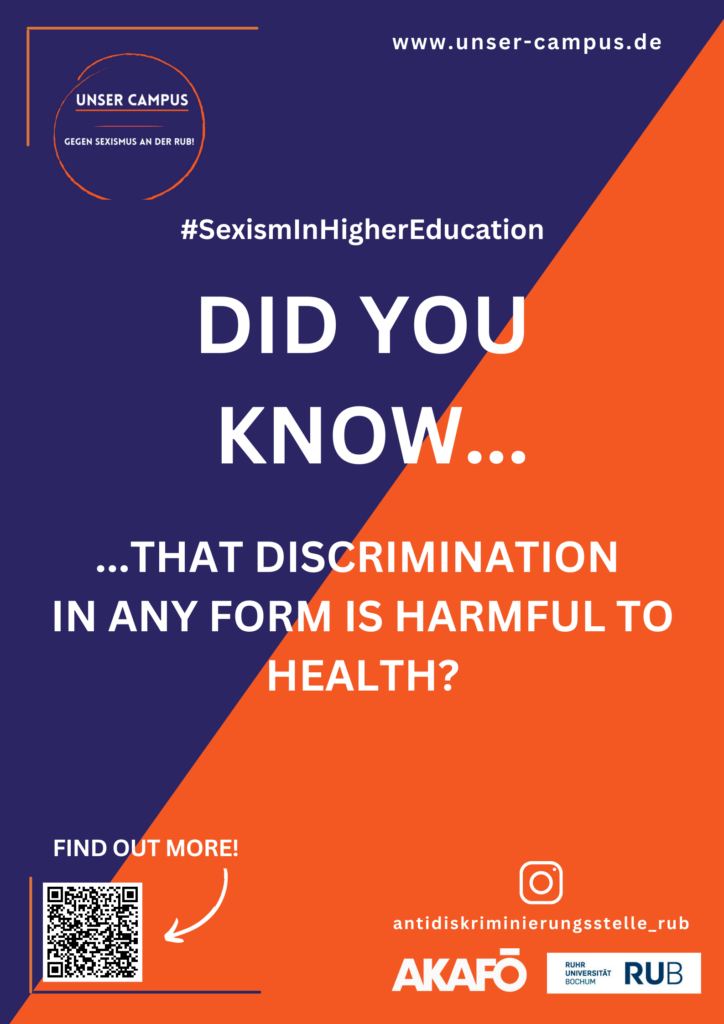
Discrimination can be defined as any form of disadvantage, devaluation or injustice towards persons or groups based on certain identity characteristics. These include, for example, gender identity, ethnic origin, sexual orientation, religious affiliation or socio-economic status.
Psychological consequences of discrimination
Discrimination can have serious psychological consequences that can greatly affect the well-being of those affected. One of the main consequences is psychological stress caused by repeated experiences of discrimination. This stress leads to an increased release of stress hormones such as cortisol and can lead to anxiety, depression and sleep disorders. In some cases, experiences of discrimination can be that traumatic that those affected develop, for example, post-traumatic stress disorder (PTSD).
Physical effects of discrimination
Discrimination can have not only serious psychological but also significant physical consequences for those affected. One of these physical effects is the increased risk of chronic diseases. Long-term discrimination can significantly increase the risk of cardiovascular disease, diabetes, hypertension and other chronic health problems. In addition, chronic stress resulting from experiences of discrimination can weaken the immune system and promote inflammatory processes in the body. This in turn can lead to various health problems and affect overall physical health. It is also worrying that studies show that people who experience discrimination often have a shortened life expectancy.
The above-mentioned effects make it clear that discrimination is not only harmful on a socio-political level, but can also have significant negative consequences for the mental health of those affected. It is therefore of great importance to actively combat discrimination and promote social justice in order to improve the health and well-being of all members of society.
Anti-discrimination work at RUB
In the study „Experiences of Discrimination at RUB“ (2023), 14.69% of the students surveyed stated that they experienced discrimination at RUB with some regularity. Discrimination based on gender, racial discrimination and discrimination based on the educational background of the parents were named most frequently (p. 6).
With the anti-discrimination guideline and the establishment of the campus-wide anti-discrimination office, RUB is actively working to create a university-wide netiquette, transparent procedural processes, as well as support structures for those affected. The RUB and the AKAFÖ also promote a campus culture that is less discriminatory with the project OUR CAMPUS – A campaign against sexism at the RUB! OUR CAMPUS aims to sensitise all RUB members to sexism and sexualised violence in the university context and at the same time promote a generally stronger sense of responsibility for a discrimination-free campus. The project also aims to develop practical skills in everyday university life and to make important contact and counselling points on and off campus better known.

Got curious?
Follow us on Instagram at @antidiskriminierungsstelle_rub and visit our blog to never miss any news and actions! We are also very happy to receive enquiries for cooperations and workshops.
Have you experienced or observed discrimination at the RUB? Then you can contact the following contact points at any time:
If you are in an acutely dangerous situation on campus or you feel uncomfortable or unsafe, you can contact the RUB Control Centre at any time on this number: 0234/3223333.
The RUB Anti-Discrimination Office offers confidential and impartial individual counselling sessions on all forms of discrimination for all members of the Ruhr-Universität. Write directly to antidiskriminierung@rub.de
Are you FINTA*?
Then you can contact the RUB Equal Opportunities Office or the Equal Opportunities Officer in your faculty. They will give you completely confidential advice. You can find a list here. Or just write directly to gleichstellung@rub.de
The autonomous queerfeminist department regularly offers events and advice on the topic. You can also network with other FINTA* on campus.
Email: aqfr@rub.de
Instagram: @queerfeministreferatrub
You are queer?
The initiative Queer at the RUB offers opportunities for exchange and collects all important information for queer university members.
The autonomous gay* department is the central contact point for gay* students. You can find more information here.
E-Mail: schwulenreferat@rub.de
In Bochum
Wildwasser e.V. is a counselling centre for victims of sexualised violence and for prevention work in Bochum. They advise and accompany those affected.
Rosa Strippe e.V. is the contact point for LGBTQIA+ persons in Bochum. Among other things, the association offers the possibility to report cases of violence directly to you online.
Throughout Germany
The helpline „Violence against women“ offers confidential and free help and support 365 days a year, around the clock, anonymously, in several languages and barrier-free throughout Germany on 08000 116 016 and via online counselling.
Men can also receive support and counselling by calling the „Violence against Men“ helpline on 0800 123 9900.
Sources and furtherreading:
Breiding, M. J., Chen, J., & Black, M. C. (2010). Intimate Partner Violence in the United States — 2010. Centers for Disease Control and Prevention, National Center for Injury Prevention and Control.
Campbell, R., Dworkin, E., & Cabral, G. (2009). An ecological model of the impact of sexual assault on women’s mental health. Trauma, Violence, & Abuse, 10(3), 225-46.
Edwards, K. M., & Sylaska, K. M. (2013). The perpetration of intimate partner violence among LGBTQ college youth: The role of minority stress. Journal of Youth and Adolescence, 42(11), 1721-31.
Gee, G. C., & Ford, C. L. (2011). Structural racism and health inequities: Old issues, new directions. Du Bois Review: Social Science Research on Race, 8(1), 115-32.
Hatzenbuehler, M. L., Phelan, J. C., & Link, B. G. (2013). Stigma as a fundamental cause of population health inequalities. American Journal of Public Health, 103(5), 813-21.
Hicken, M. T., Lee, H., Morenoff, J., House, J. S., & Williams, D. R. (2014). Racial/ethnic disparities in hypertension prevalence: Reconsidering the role of chronic stress. American Journal of Public Health, 104(1), 117-23.
Krieger, N. (2014). Discrimination and health inequities. International Journal of Health Services, 44(4), 643-710.
Krug, E. G., Mercy, J. A., Dahlberg, L. L., & Zwi, A. B. (Eds.). (2002). World report on violence and health. World Health Organization.
Sow, N. (2008). Deutschland Schwarz Weiß: Der alltägliche Rassismus. C. H. Beck.
Tjaden, P., & Thoennes, N. (2006). Extent, nature, and consequences of rape victimization: Findings from the National Violence Against Women Survey. U.S. Department of Justice, Office of Justice Programs, National Institute of Justice.
Weichselbaumer, D. (2016). Diskriminierung und Gesundheit: Eine sozialpsychologische Perspektive. Springer VS.
Williams, D. R., Lawrence, J. A., & Davis, B. A. (2019). Racism and health: Evidence and needed research. Annual Review of Public Health, 40, 105-125.

